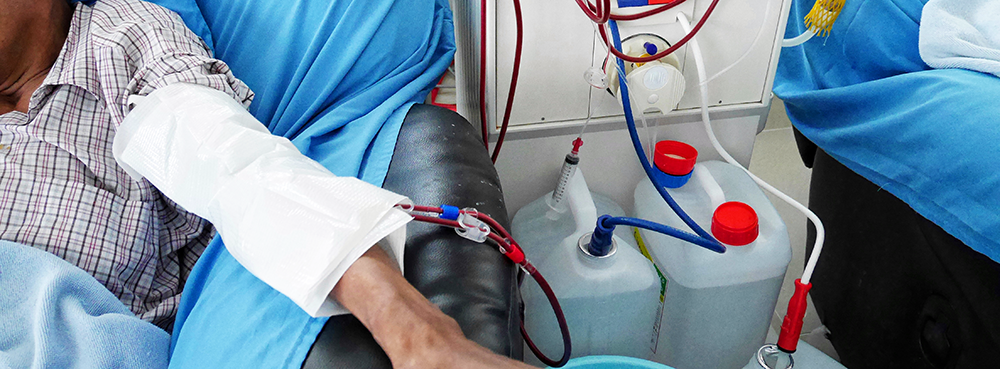Medical Waste Considerations for Dialysis Centers

Are you part of a facility that specializes in nephrology, dialysis, renal care, or kidney care? If so, we need to chat.
Are you aware of your responsibility for the segregation, collection, and disposal of medical waste? What about federal regulations regarding waste segregation? What about sharps container placement? There are a lot of questions Daniels Health can assist you in answering; most importantly, are the guidelines for your facility compliant with every federal and state regulation? Of course, the first issue to consider when it comes to biomedical waste disposal is safety – for you and your patients. Make sure to follow the rules for pharmaceutical waste disposal or clinical waste too. Daniels Health can help you unpack all of these pieces that equal a compliant facility.
Solutions for Dialysis Centers
Who governs medical waste disposal considerations for dialysis centers?
A number of federal guidelines and regulations are applicable to medical waste generated by a dialysis center. Among them:
- The Environmental Protection Agency (EPA)
- Occupational Safety and Health Administration (OSHA)
- The National Institute of Occupational Safety and Health (NIOSH)
- The Drug Enforcement Agency (DEA)
- Department of Transportation (DOT)
Don’t forget about state regulations. In most states, the state regulations supersede federal regulations, mainly because they’re often more detailed and stringent. In most cases, dialysis center personnel can find state regulations by visiting the EPA’s Resource Conservation and Recovery Act information pages, which defines regulations for hazardous waste and nonhazardous waste.
Safety standards for individuals working in dialysis centers are overseen by the Occupational Safety and Health Administration (OSHA) for the most part, especially under the guidelines found in OSHA’s (1910.1030 (blood-borne pathogens) standards.
How is dialysis waste classified?
State guidelines differ slightly in regard to wording and definitions. For example, Florida’s Department of Health defines biomedical waste as any solid or liquid waste that might present threat of infection to humans including blood, blood products, and body fluids from human. It also includes discarded sharps. Those definitions are relevant to a dialysis center.
When it comes to sharps or a sharps container, such containers must be puncture-resistant, rigid, and designed for sharps containment. They must also be clearly labeled based on standards applicable to section 64E-16.004. In the state of Florida, biomedical waste, with the exception of sharps, must be packaged and sealed at the point of origin in red plastic bags, or based on the generator, into sharps containers. Specific guidelines for sharp container construction, size, and labeling are also stipulated. This is why it’s so important to work with one of our experts at Daniels Health who are familiar with state regulations for dialysis centers.
In the state of Colorado, medical and pharmaceutical waste management is under the purview of the Colorado Department of Public Health and Environment (6 CCR 1007–3) which defines hazardous waste management systems. Part 261 defines identification and listings of hazardous waste. Colorado state guidelines specify definitions for hazardous waste, hazardous waste constituents, and hazardous secondary materials such as byproducts, all found under Part 261.
It’s easy to see how all of this can confusing quickly.
Where to find your state’s regulations
In the state of Alaska, definitions and guidelines for medical waste disposal are found under the purview of the Division of Environmental Health, and define medical waste as anything that is potentially infectious or pathogenic, including blood and other bodily fluids, dialysis filters, bags and equipment, from both facility-based and home-based treatments.
In the state of Delaware, the disposal of infectious waste and waste management guidelines are found under the Environmental Health and Safety Administration, who define infectious waste as anything that may potentially cause a human disease or contain pathogenic organisms, or pose a risk to human health or the environment when it’s improperly stored, treated, transported, manage, or disposed of.
You’re getting the picture, right? It’s the waste generator’s responsibility to know these details. The ‘ol “cradle to grave” concept means you are responsible for the entire journey of your medical waste—from production to final disposal or destruction.
As with other states, biological waste includes but is not limited to:
- biological liquid wastes, including blood and blood products, as well as body fluids or liquid waste produced through renal dialysis
- pathological wastes
- laboratory wastes
- human dialysis waste including dialysate membranes and bloodlines
Attention to detail is important when it comes to compliance, collection, medical waste segregation, and handling of biohazard waste and biomedical waste disposal. Failure to adhere to federal and state guidelines can result in fines, penalties, risk to reputation, as well as potential jail time.
Fines and penalties
Fines and penalties associated with noncompliance when it comes to medical waste disposal are no joke. In 2018, the federal government (RCRA) increased fines for violations from approximately $22,500 to up to $93,000, per violation or per every day the violation is not addressed.  Other regulatory agencies including OSHA, as well as state departments of health, accrediting facilities, and other federal and state compliance regulatory agencies can also apply fines. We’re talking about noncompliance regarding the Clean Air Act, the Clean Water Act, or the Comprehensive Environmental Response, Compensation, and Liability Act.
Other regulatory agencies including OSHA, as well as state departments of health, accrediting facilities, and other federal and state compliance regulatory agencies can also apply fines. We’re talking about noncompliance regarding the Clean Air Act, the Clean Water Act, or the Comprehensive Environmental Response, Compensation, and Liability Act.
Civil codes in states around the country have the right to fine first, second, or even third infractions in ever-increasing amounts from $1,000 up to $25,000, often alone with jail time.
Why take the chance?
Daniels Health provides expertise and experience when it comes to compliance, waste segregation, and sharps container solutions for dialysis centers and other healthcare facilities. Healthcare waste management and proper medical waste disposal is essential. Don’t take chances. Reduce the risk of fines and penalties by staying compliant. Learn more about our complete solutions for dialysis centers by clicking on the link below.
Let's Talk!
Your time is valuable, and we don’t want to play hard to get. You can either phone us directly on the details listed on our contact page, or feel free to fill out this short form and one of our team members will get back to you as quickly as possible.
